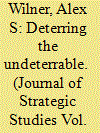| Srl | Item |
| 1 |
ID:
102370


|
|
|
|
|
| Publication |
2011.
|
| Summary/Abstract |
This article argues that deterrence theory can be applied to counterterrorism. Doing so requires broadening the traditional concept of deterrence by punishment, expanding deterrence by denial to include defense, mitigation, and strategic hindrance, and developing deterrence by delegitimization to influence the political, ideological, and religious rationales informing terrorist behavior. In practice, deterring terrorism requires tailoring threats against state and individual facilitators, diffusing the intended consequences of terrorism, and manipulating terrorist self-restraints. When these and other deterrent leverages are applied simultaneously against various actors and processes involved in terrorism, coercion can be achieved.
|
|
|
|
|
|
|
|
|
|
|
|
|
|
|
|
| 2 |
ID:
120433


|
|
|
|
|
| Publication |
2013.
|
| Summary/Abstract |
An ongoing debate among policymakers and terrorism scholars concerns the effectiveness of deterrence as a counterterrorism tool. Absent from the debate is a discussion of the complex nature of terrorist decision making. Decisions are made at varying levels in a terrorist organization, often by actors having different motives, resulting in behavior that is not always fully rational. This article identifies several circumstances when terrorist behavior is not the product of an entirely unitary, rational decision-making process, and therefore highlights when deterrence policies will be least effective. It concludes with some policy implications for understanding when deterrence policies are most likely to succeed and how to address terrorism in other situations.
|
|
|
|
|
|
|
|
|
|
|
|
|
|
|
|